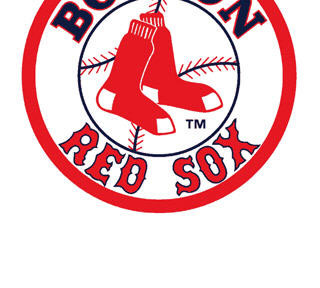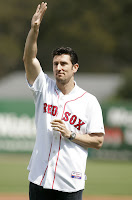I’ll be honest: I love to rip on the media. My frustration is neither strictly ideological — although, as an avid New York Times reader, my jabs tend to come from somewhere around center-right — nor completely random, but this current explosion is admittedly a bit out of left field.
I love Nomar Garciaparra. An All-Star shortstop for the Red Sox and a baseball icon for the youth of Boston from the moment he first stepped onto Fenway’s glistening diamond in 1996 until his contentious last days in the summer of 2004, Number 5 was the king. His obsessive-compulsive batting rituals, mysterious middle name (you mean you didn’t know his first name was Anthony?), and searing line drives were tailor-made for baseball-mad New England. Comparisons with Ted Williams became ever more frequent; in 2000, Nomar flirted with a .400 batting average. He graced the cover of Sports Illustrated, and soon suffered from its notorious curse; the ghost of Al Reyes (who joins Sox fans’ eternal blacklist, along with Grady Little) haunted him and eventually derailed his 2001 season. He was never the same afterward, but still we loved him.
Then came 2004. Or that’s what certain members of Boston’s sports-writing elite would have us believe. In reality, the rapid downward spiral of Nomar’s time in Boston began in the winter of 2003, when rumors were swirling as to the possible acquisition of Alex Rodriguez, then the shortstop for the Texas Rangers. The persistence of the public speculation was a slap in the face to Garciaparra, who’d played for his entire career with an intensity and vigor that stood in stark contrast to the lackadaisical approach of fellow Sox superstars Pedro Martinez and Manny Ramirez. Nomar ran hard on every play, whether at bat or in the field; his numerous throwing errors were usually a result of attempting spectacular plays that most shortstops could never have attempted.
So it was understandable, then, that his attitude heading into the 2004 baseball season, immediately following his seventh full year with the Sox (he was on the All-Star team in five of those years), was less than amiable. If Nomar had a fault, it was not comprehending the nature of the beast that is the Boston sports media. And no one embodied this vindictive spirit more than Dan Shaughnessy of the Boston Globe. This was the same guy who once criticized Sox outfielder Carl Everett so vociferously that the player famously dubbed him the “curly-haired boyfriend” of Gordon Edes, a fellow (far more talented) baseball writer for the Globe. To this day, members of online Red Sox forums still refer to Shaughnessy derisively as “CHB.”
During the summer of 2004, Shaughnessy and several of his colleagues from Boston media outfits — notably including the then-novel bostondirtdogs.com, which at this moment has a sub-headline that reads “The Nomar Phonyfest Is Now Over, Everyone Go Take a Steaming Hot Shower” — went to work ruining the stellar reputation Garciaparra had nurtured over his long and illustrious career. The coverage launched a vicious cycle, as Nomar became more disillusioned with perceptions of him as a lazy and uncommitted player — allegations that, up until that season, were unthinkable — and the media caught on to his frustrations, perpetuating his misery. When he was finally traded just before the deadline in July 2004, his departure was heralded as the relieving end to a burdening era. Boston’s World Series triumph just three months later — its first in eighty-six years — appeared to lend credence to the view that Nomar had been expendable at best, a serious detriment at worst.
Fast forward six years. Nomar has just announced his retirement, and in a move that prompted a wave of hardball nostalgia for me and thousands of other like-minded fans, signed a one-day minor league contract with the Red Sox. “I’ve always had a recurring dream,” Nomar said, “…to be able to retire in a Red Sox uniform, and thanks to Mr. Henry, Mr. Werner, Mr. Lucchino, and Theo [Epstein] and the Red Sox organization, today I do get to retire, I get to fulfill that dream and retire as a Red Sox.”
Nomar, then, has achieved his dream of retiring with the team, and the city, that has always adored him. In response, the Boston media — and Dan Shaughnessy especially — have taken to excoriating him once again. His crime? Although they’d never admit this, it is only Nomar’s disinclination towards engaging the media that eventually led to the demise of his public image in Boston. Unlike Pedro, who embraced his larger-than-life role in Boston sports, or Manny, who was seemingly oblivious to it all, Nomar was actively uninterested in burnishing his reputation through exclusive interviews and media hobnobbing. This would cost him dearly.
On March 11, Dan Shaughnessy wrote a column which began, “Great player. Total fraud. Welcome home, Nomie.” His unfounded vitriol underscored his own prejudice and, even worse, highlighted his ignorance of that intangible factor that makes baseball so transcendent: the heartfelt connection between a player and his fans. Unlike members of rock bands, or politicians, or any number of other public figures, a hard-nosed and talented baseball player like Nomar Garciaparra has the potential to capture the hearts and minds of millions and remain in their memories for a lifetime. Dan Shaughnessy and his vindictive cohorts will be long gone before the echoes of Nomar Garciaparra’s legendary years in Boston ever fade from the city’s collective consciousness.
Welcome home indeed, Nomar.

